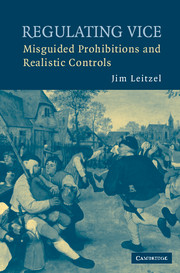Book contents
- Frontmatter
- Contents
- List of tables and boxes
- Preface
- Introduction
- 1 The Harm Principle
- 2 Addiction: Rational and Otherwise
- 3 The Robustness Principle
- 4 Prohibition
- 5 Taxation, Licensing, and Advertising Controls
- 6 Commercial Sex
- 7 The Internet and Vice
- 8 Free Trade and Federalism
- Conclusions
- Appendix: Vice Statistics
- References
- Index
8 - Free Trade and Federalism
Published online by Cambridge University Press: 06 January 2010
- Frontmatter
- Contents
- List of tables and boxes
- Preface
- Introduction
- 1 The Harm Principle
- 2 Addiction: Rational and Otherwise
- 3 The Robustness Principle
- 4 Prohibition
- 5 Taxation, Licensing, and Advertising Controls
- 6 Commercial Sex
- 7 The Internet and Vice
- 8 Free Trade and Federalism
- Conclusions
- Appendix: Vice Statistics
- References
- Index
Summary
The Internet demonstrates how cross-jurisdictional exchange of ideas, services, and goods threatens preexisting vice regulations. Exchange, however, is vital for raising living standards and fostering economic growth. As a result, there is a longstanding conflict between vice control and commitments to open trade, between the fundamental principle of market freedom and the desirability of vice policy exceptionalism. Vice-related problems perceived to stem from trade policy will generate political reactions: if free trade extends to vice goods, and social problems mount in the face of the unfettered trade, then a free-trade policy becomes decidedly less appealing.
Alternatively, it might be a liberal vice policy that proves unsustainable in the face of a free trade mandate. In other words, the impossibility of providing special restrictions upon trade in legal vice might lead to a world of near or total prohibition. If the only available vice policy options are (1) the ketchup alternative, that is, legal vice with no vice-specific restrictions or (2) illegal or intensely regulated vice (the current heroin control regime, perhaps), then it might be that polities find themselves choosing the second option. Alcohol, cigarettes, and other vice goods are not ordinary commodities like ketchup, and public policy should respond to the special issues presented by such goods. Allowing free trade to overrule vice controls, requiring that alcohol be treated identically to ketchup as components of commerce, holds dangers for vice policy as well as for free trade.
- Type
- Chapter
- Information
- Regulating ViceMisguided Prohibitions and Realistic Controls, pp. 247 - 267Publisher: Cambridge University PressPrint publication year: 2007



